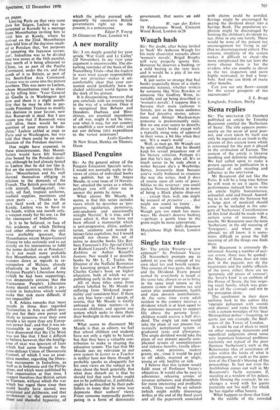Biased Penguins
Sir: As the general editor of the Penguin Education Specials series, I would not normally reply to the views of critics of individual books we publish, but as Mr Angus Maude, in your issue of 14 Novem- ber, attacked the series as a whole, perhaps you will allow me to answer the points he raises.
What alarms Mr Maude, it seems, is that this series includes views which he describes as 'pro- gressive, egalitarian, permissive, anti-academic and occasionally straight Marxist'. It is true, and I must admit it, that we have not been offered a manuscript which is anti-progressive, elitist, authori-__ tarian, academic and rooted in laissez-faire capitalism, but I would myself not choose this set of terms to describe books like Bar- bara Furneaux's The Special Child, or Richard Layard's The Impact of Robbins or Arthur Razzell's Juniors.- Nor would I so describe books by Mr L. C. Taylor, the Director of the Nuffield Resources for Learning project, or Professor Charles Carter's book on higher education, both of which we are publishing early in the new year.
All of these titles come from editors labelled by Mr Maude as suffering from 'blinkered impar- tiality' and 'consistent bias'. If there is any bias here—and I accept, of course, that Mr Maude is totally unbiased in these matters—it is towards children, and against any system which seeks to deny them their birthright in the name of edu- cation.
What seems to disconcert Mr Maude is that, as editors, we feel that school children and students have not only a right to be heard, but that they have a valuable con- tribution to make in shaping the education system. The fact that Mr Maude sees no relevance to our own system in Letter to a Teacher is neither here nor there, though it probably speaks as eloquently for his own views on the subject as it does about the book generally. But what does disturb me is that he should feel that such books ought not to be published or, if published, ought to -be described by their pub- lishers in tones that in some way deprecate their authors' views. From someone supposedly partici- pating in a form of democratic government, that seems an odd view.
W. van der Eykett 54 Peckarmans Wood, Crescent Wood Road, London sE26










































 Previous page
Previous page